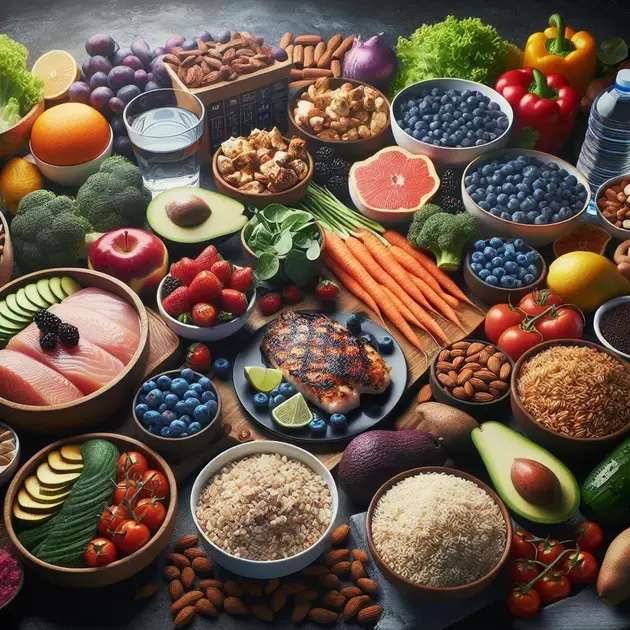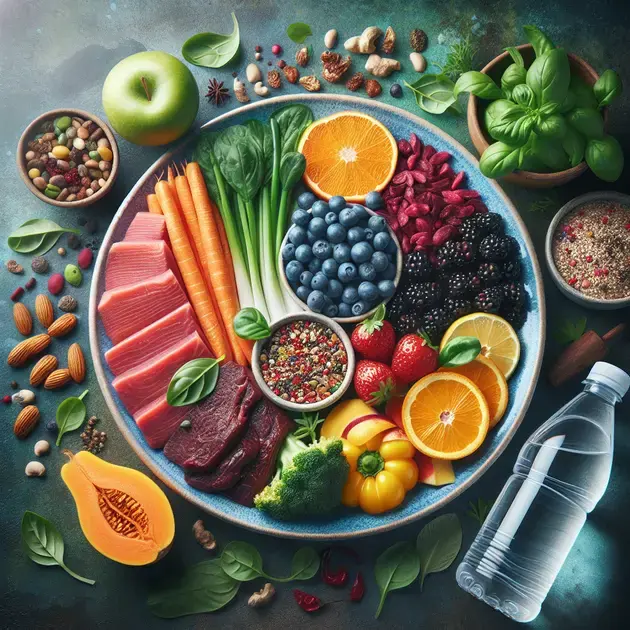When it comes to achieving weight loss goals, one of the most crucial factors is the selection of nutritious food options. A well-balanced diet plays a significant role in not only shedding excess pounds but also maintaining a healthy lifestyle. With the right combination of foods, you can fuel your body with essential nutrients while promoting weight loss.
Fortunately, there are various nutritious food options available that can aid in your weight loss journey. From lean proteins to fiber-rich fruits and vegetables, making smart food choices can help you reach your desired weight in a sustainable and healthy way. Let’s explore some of the top nutritious foods that are not only delicious but also beneficial for weight loss.

Lean Proteins for Muscle Building and Satiety
When it comes to weight loss, incorporating lean proteins into your diet is essential for muscle building and providing a feeling of satiety. Lean proteins are low in fat and calories, making them a great choice for those looking to shed excess pounds. One popular app that can help you track and plan your lean protein intake is MyFitnessPal. This app allows you to set dietary goals and provides nutritional information for a wide range of foods.
Here is a step-by-step guide to incorporating lean proteins into your meals:
Step 1: Choose Lean Protein Sources
Opt for sources such as skinless poultry, tofu, fish, lean cuts of beef, and legumes. These options are high in protein and low in unhealthy fats.
Step 2: Plan Your Meals
Use a meal planning app like Mealime to create balanced meals that include lean proteins, vegetables, and whole grains.
Step 3: Monitor Your Intake
Track your daily protein consumption using apps like MyPlate to ensure you are meeting your protein goals without exceeding your calorie limits.
Step 4: Get Creative with Recipes
Explore cooking websites like Skinnytaste for delicious and healthy recipes that incorporate lean proteins in satisfying ways.
By following these steps and making lean proteins a staple in your diet, you can support muscle growth and feel fuller for longer, aiding in your weight loss journey.
Fiber-Rich Fruits and Vegetables for Digestive Health
Incorporating fiber-rich fruits and vegetables into your diet is crucial for supporting digestive health and promoting weight loss. Fruits and vegetables are packed with essential vitamins, minerals, and antioxidants while being low in calories and high in fiber. To help you make informed choices, apps like Fooducate offer detailed information on the nutritional content of various fruits and vegetables.
Here is a step-by-step guide to adding fiber-rich fruits and vegetables to your diet:
Step 1: Include a Variety of Colors
Choose fruits and vegetables of different colors to ensure you are getting a wide range of nutrients and antioxidants.
Step 2: Snack on Fruits and Veggies
Keep a selection of fresh fruits and cut vegetables on hand for convenient and healthy snacking throughout the day.
Step 3: Bulk up Your Meals
Add extra vegetables to soups, salads, and stir-fries to increase your fiber intake and promote feelings of fullness.
Step 4: Experiment with New Options
Try new fruits and vegetables regularly to keep your meals exciting and ensure you are getting a variety of nutrients.
By following these steps and choosing fiber-rich options, you can improve your digestive health, feel satisfied, and support your weight loss goals.
Smart Food Choices for Sustainable Weight Loss
Making smart food choices is key to sustainable weight loss and overall well-being. By selecting nutrient-dense foods that are low in empty calories, you can fuel your body effectively while promoting fat loss. Apps like Lose It! can help you set personalized weight loss goals and track your food intake to stay on target.
Here is a step-by-step guide to making smart food choices for sustainable weight loss:
Step 1: Focus on Whole Foods
Choose whole, unprocessed foods like whole grains, lean proteins, fruits, vegetables, and healthy fats to provide your body with essential nutrients.
Step 2: Avoid Added Sugars and Processed Foods
Avoid foods high in added sugars, refined grains, and unhealthy fats, as these can contribute to weight gain and may be lacking in nutritional value.
Step 3: Practice Mindful Eating
Use apps like Mindful Eating Tracker to cultivate healthy eating habits, such as eating slowly, savoring each bite, and listening to your body’s hunger cues.
Step 4: Stay Hydrated
Keep track of your water intake using apps like WaterMinder to ensure you are properly hydrated, as dehydration can sometimes be mistaken for hunger.
By following these steps and making informed food choices, you can achieve sustainable weight loss and support your long-term health and wellness goals.

**
High-Quality Carbohydrates for Energy and Sustained Fullness
**
High-quality carbohydrates are essential for providing the body with a steady source of energy and promoting feelings of fullness. When choosing carbohydrates, opt for whole grains, fruits, vegetables, and legumes that are rich in fiber. These complex carbohydrates are digested more slowly, preventing spikes in blood sugar levels and providing sustained energy throughout the day. Including sources such as brown rice, quinoa, sweet potatoes, and oats in your meals can help you feel satisfied and energized for longer periods.
To incorporate high-quality carbohydrates into your diet, start by swapping refined grains for whole grains. Choose whole wheat bread, whole grain pasta, and quinoa instead of white rice or regular pasta. Include a variety of colorful fruits and vegetables in your meals to increase fiber intake and add nutrients to your diet. Try incorporating legumes like lentils, chickpeas, and black beans into soups, salads, and stews for an extra boost of fiber and protein.
Consuming high-quality carbohydrates can also aid in weight management by promoting feelings of fullness and reducing unnecessary snacking. By choosing unprocessed and nutrient-dense carbohydrate sources, you can support your energy levels, improve digestion, and maintain a healthy weight in the long run.
Incorporating high-quality carbohydrates into your meals can be as simple as adding a side of roasted sweet potatoes to your dinner or enjoying a bowl of oatmeal topped with fresh berries for breakfast. Experiment with different grains, fruits, and vegetables to create delicious and satisfying meals that support your energy levels and overall well-being.
Remember to balance your carbohydrate intake with protein and healthy fats to create well-rounded meals that provide sustained energy and promote optimal health.
**
Healthy Fats for Brain Function and Hormone Regulation
**
Healthy fats play a crucial role in supporting brain function, hormone regulation, and overall health. Incorporating sources of healthy fats such as avocados, nuts, seeds, and olive oil into your diet can provide essential nutrients like omega-3 fatty acids and monounsaturated fats. These fats are important for cognitive function, mood regulation, and hormone production in the body.
To enhance brain function and hormone regulation, include oily fish like salmon, mackerel, and sardines in your diet to boost your intake of omega-3 fatty acids. These essential fats are known for their anti-inflammatory properties and benefits for brain health. Additionally, incorporating sources of monounsaturated fats like avocados, almonds, and olive oil can support heart health and improve cholesterol levels.
Healthy fats are also important for nutrient absorption, as certain vitamins like vitamin D, E, and K are fat-soluble and require fats to be properly absorbed by the body. Including a variety of healthy fats in your meals can help maximize the absorption of essential nutrients and support overall health and well-being.
When incorporating healthy fats into your diet, focus on portion control and balance. While fats are essential for health, they are also calorie-dense, so it’s important to be mindful of your serving sizes. Aim to include a variety of fats in your meals, such as adding a handful of nuts to your yogurt or drizzling olive oil over your salads for added flavor and nutrients.
By prioritizing sources of healthy fats in your diet, you can support brain function, hormone balance, and overall health. Experiment with different types of healthy fats and incorporate them into your meals to create delicious and nutritious dishes that nourish your body and mind.
**
Hydration for Appetite Control and Metabolism Support
**
Hydration plays a critical role in appetite control and metabolism support. Staying properly hydrated is essential for regulating hunger cues, supporting digestion, and optimizing metabolic function. Drinking an adequate amount of water throughout the day can help prevent overeating, promote feelings of fullness, and boost metabolism.
Start by incorporating water-rich foods like fruits and vegetables into your meals to increase your fluid intake. Foods like cucumbers, watermelon, and oranges are excellent sources of hydration and can contribute to your overall water intake. Additionally, carrying a reusable water bottle with you throughout the day can serve as a reminder to stay hydrated and make it easier to meet your daily fluid needs.
Proper hydration can also support metabolic function by aiding in the transportation of nutrients, removal of waste products, and regulation of body temperature. When your body is well-hydrated, your metabolism can function more efficiently, leading to better energy levels and overall well-being. Aim to drink water regularly throughout the day, especially before meals and during physical activity, to support appetite control and metabolic health.
Incorporating herbal teas, unsweetened sparkling water, and infused water with fresh fruits and herbs can add variety to your hydration routine and make drinking water more enjoyable. Experiment with different flavors and combinations to find options that appeal to your taste preferences and keep you hydrated throughout the day.
By prioritizing hydration as part of your daily routine, you can support appetite control, metabolism, and overall health. Making small changes like keeping a water bottle handy, eating water-rich foods, and incorporating hydrating beverages can have a significant impact on your well-being and help you maintain optimal hydration levels for improved appetite regulation and metabolism.
Conclusion
In conclusion, prioritizing high-quality carbohydrates in your diet is crucial for sustained energy levels and feelings of fullness. By choosing whole grains, fruits, vegetables, and legumes rich in fiber, you can support your overall well-being and weight management. Including sources like brown rice, quinoa, sweet potatoes, and oats in your meals can help you feel satisfied and energized throughout the day.
Additionally, incorporating healthy fats such as avocados, nuts, seeds, and olive oil plays a vital role in brain function, hormone regulation, and nutrient absorption. Ensuring a balanced intake of omega-3 fatty acids and monounsaturated fats from sources like oily fish and avocados can support cognitive health, mood stability, and heart health. Remember to practice portion control and include a variety of healthy fats in your meals for optimal benefits.
Moreover, hydration is key for appetite control and metabolic support. Drinking an adequate amount of water and consuming water-rich foods can help regulate hunger cues, promote fullness, and enhance metabolic function. By maintaining proper hydration levels and incorporating hydrating beverages like herbal teas and infused water, you can improve your overall well-being, energy levels, and metabolic health.